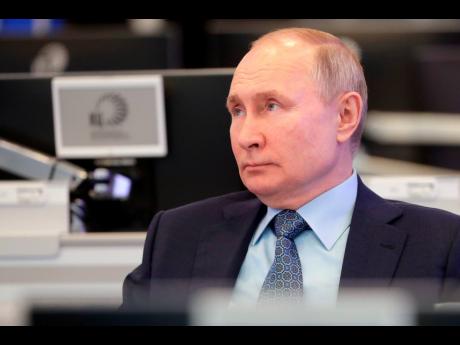US expels Russian diplomats, imposes sanctions for hacking
WASHINGTON (AP):
The Biden administration on Thursday announced the US is expelling 10 Russian diplomats and imposing sanctions against dozens of companies and people, holding the Kremlin accountable for interference in last year’s presidential election and the cyber hacking of federal agencies.
The sweeping measures are meant to punish Russia for actions that US officials say cut to the core of American democracy and to deter future acts by imposing economic costs on Moscow, including by targeting its ability to borrow money. The sanctions are certain to exacerbate tensions with Russia, which promised a retaliatory response.
Sanctions against six Russian companies that support the country’s cyber efforts represent the first retaliatory measures against the Kremlin for the hack familiarly known as the SolarWinds breach, with the US explicitly linking the intrusion to the SVR, a Russian intelligence agency. Though such intelligence-gathering missions are not uncommon, officials said they were determined to act because of the operation’s broad scope and the high cost of the intrusion on private companies.
The US also announced sanctions on 32 individuals and entities accused of attempting to interfere in last year’s presidential election, including by spreading disinformation. US intelligence officials alleged in a declassified report last month that Russian President Vladimir Putin authorised influence operations to help Donald Trump in his unsuccessful bid for re-election as president, though there’s no evidence Russia or anyone else changed votes or manipulated the outcome.
The actions, foreshadowed by the administration for weeks, signal a harder line against Putin, whom Trump was reluctant to criticise even as his administration pursued sanctions against Moscow. They are the administration’s second major foreign policy move in two days, following the announcement of troop withdrawals from Afghanistan. Until now, President Joe Biden has focused on the coronavirus pandemic and economy in his first months in office.
The 10 diplomats being expelled include representatives of Russian intelligence services, the Biden administration said. They were selected on the basis “that they were acting in a manner inconsistent with their status in the United States”, a senior official said.
Other measures are expected as well, though the administration is not likely to announce them. Officials have been advising that their response to Russia would be in ways both seen and unseen.
The sanctions announced Thursday are the latest in a series of actions that successive presidential administrations have taken to counter Russian behaviour seen as antagonistic. Both Trump and Barack Obama expelled individual diplomats during their presidencies.
Some experts suggest this latest round might have more resonance because of its financial impact: The order makes it more difficult for Russia to borrow money by barring US banks from buying Russian bonds directly from the Russian Central Bank, Russian National Wealth Fund and Finance Ministry.
The White House did not impose sanctions related to separate reports that Russia encouraged the Taliban to attack US and allied troops in Afghanistan, saying instead that Biden was using diplomatic, military and intelligence channels to respond.
Reports of alleged “bounties” surfaced last year, with the Trump administration coming under fire for not raising the issue directly with Russia. Administration officials said Thursday they had low to moderate confidence in that intelligence.
After the sanctions were announced, Russian Foreign Ministry spokeswoman Maria Zakharova warned that “such aggressive behaviour will undoubtedly trigger a resolute retaliation”.

